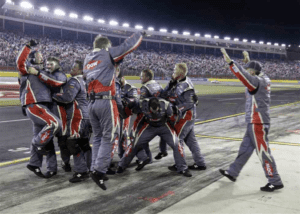High-Performance Teams

Seventy percent (70%) of all strategic program initiatives fail. That is a brutal fact that is well documented and proved. Having worked with hundreds of organizations we have discovered that much of the problem occurs in the way people work together ~ the way they communicate to and from each other; the way they support one another. The level of integrity that’s present amongst the team and in the project, as well as the way they each regard one another ~ it’s in all of those elements that the success of an initiative exists.
We have developed five essential practices for building High Performance Teams:
1 ~ Authentic Listening. This is way easier said than done as most people think they are a good listener ~ not true. Authentic listening requires the ability to get in another’s world ~ not just their words, but the place from which they are speaking, as well as understanding what they are intending to say. Two good habits to develop this skill are: 1) give the speaker your undivided attention and, 2) repeat back to the person what you heard and what you think their intention is in what they said. This gives the speaker an opportunity to confirm or correct your feedback.
2 ~ Talking Straight. This means getting things up on the table that are difficult or uncomfortable to address ~ and to do that in such a way that people are left respected, honored and empowered. At the same time, it’s essential to get the issue, (the elephant in the room), dealt with head on. It’s a fine line between confronting something that is difficult to talk about and doing so with the sensitivity it requires ~ this takes courage and grace at the same time.
3 ~ Working as a Team. Watch any professional sports team that is working successfully and this becomes apparent. It requires a “pit crew” mentality. Each person on the team backs up, supports and empowers the others. Their win belongs to each of them. “Your win is my win. Your loss is my loss.” They work together in such a way that extraordinary results take place. They back each other up and they support one another in difficult situations and circumstances. No one gets toppled by little things. Nothing gets in the way.
4 ~ Honoring Your Word. If this one doesn’t happen, you can forget the rest. This is simply working toward doing what you say you will do. It’s doing what you know to do, what’s expected, and what you know is right. And everybody knows how to do this ~ the question is, do they do it? Fundamental to this is cleaning it up when you don’t do what you said you would do. Clean it up immediately and move on.
5 ~ Being Complete. The practice of being complete means that you don’t step over the trash. If something needs to be said, dealt with, or cleared up, it gets dealt with right away. The team understands that when you operate on top of issues, resentments and things unsaid, everything comes to a grinding halt. So this one’s about getting things complete so they get clear and there is a level of appreciation maintained by developing the practices of doing so. In sports you see the guys in the dugout or on the court high-fiving each other with each little win throughout the game. This is no different than validating success.
By having these five practices in place you can build a high-performance team. We’ve seen that when teams have these five components working actively, the likelihood of success turns around dramatically from 70% likely to fail to 85% likely to succeed. We have a proven track record for successful project implementation when these five principles are utilized and present.
